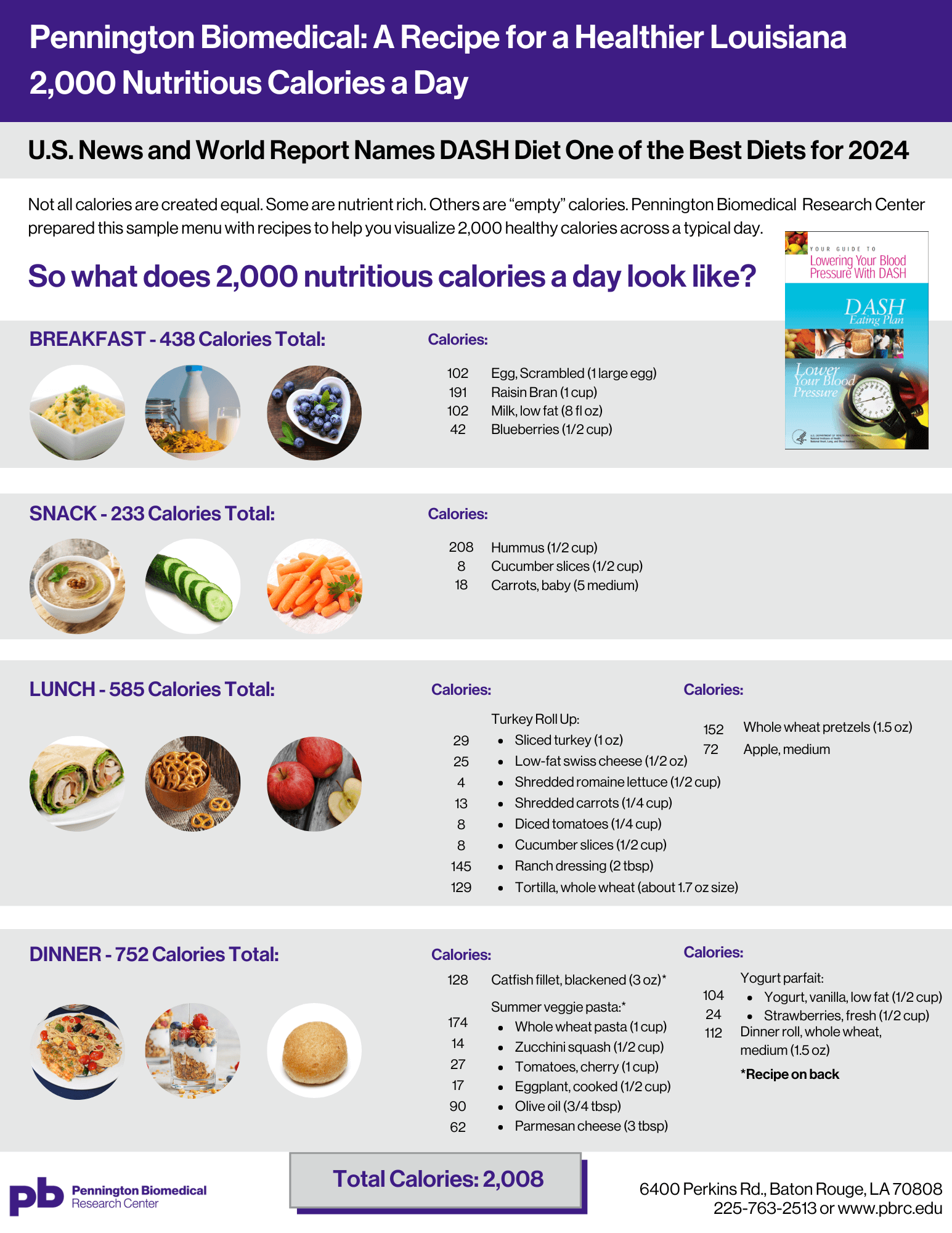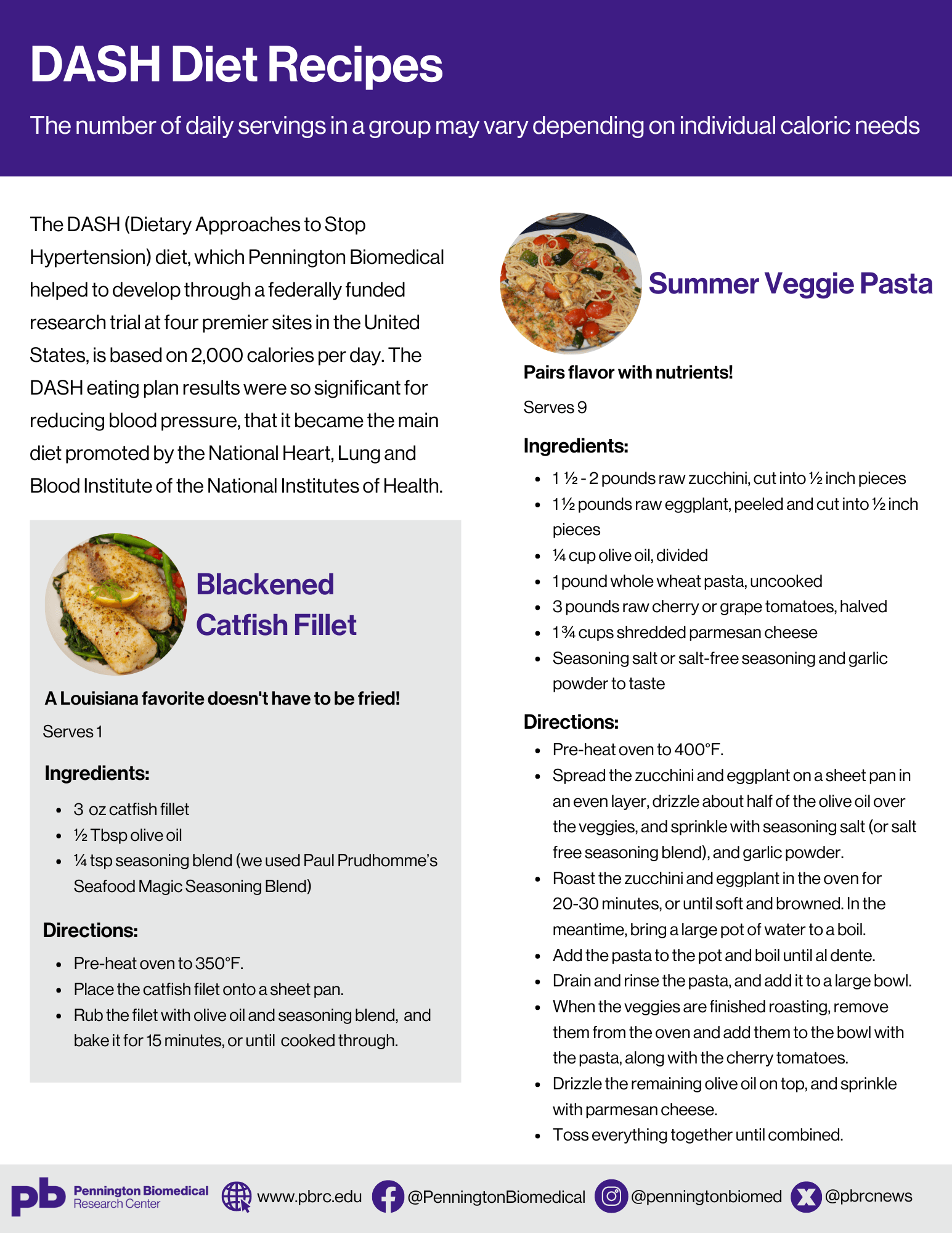Good Health is Good Business
Since 2011, U.S. News & World Report Has Rated the DASH Diet Among the Top in the Best Diet Overall and Best Diet for Healthy Eating
May 30, 2024 · Baton Rouge, LA
Pennington Biomedical Helped Develop the Heart-Healthy Eating Plan
 Looking for a healthy eating plan? Why not try the DASH Diet, developed in part by
Pennington Biomedical Research Center and ranked as one of U.S. News & World Report’s
Best Diets since 2011. The American Heart Association also ranks the DASH Diet as
the top heart-healthy eating style.
Looking for a healthy eating plan? Why not try the DASH Diet, developed in part by
Pennington Biomedical Research Center and ranked as one of U.S. News & World Report’s
Best Diets since 2011. The American Heart Association also ranks the DASH Diet as
the top heart-healthy eating style.
“The DASH Diet is one of the best examples of Pennington Biomedical putting scientific discovery into the hands of our community,” said Pennington Biomedical Executive Director John Kirwan, Ph.D. “DASH is a real food diet. It’s practical information that can change a person’s life for the better.”
The DASH Diet is ranked as a top diet in multiple categories, including:
- Best Diets Overall (No. 2)
- Best Heart-Healthy Diets (No. 2)
- Best Diabetes Diets (No. 2)
- Best Diets for Bone and Joint Health (No. 2)
- Best Diets for Healthy Eating (No. 3)
- Easiest Diets to Follow (No. 3)
- Best Family Friendly Diets (No. 3)
- Best Weight-Loss Diets (No. 5)
The DASH (Dietary Approaches to Stop Hypertension) diet was developed as a result of a federally funded trial at four sites, one of which was Pennington Biomedical. The diets from those trials were finalized by researchers at Pennington Biomedical. Following the DASH studies, the results were so significant that this diet became the main diet recommended by the National Heart, Lung, and Blood Institute of NIH. It is more than a diet for good heart health.
Overall, it’s a great addition for lifestyle and weight management, a concept which was the focus of follow-up studies at Pennington Biomedical and other sites across the US.
The DASH plan is based on 2,000 calories a day. The number of daily servings in a food group may vary depending on your caloric needs. A DASH Diet overview booklet, including DASH diet menus and recipes, is available for download free of charge.
The diet emphasizes fruits and vegetables, low-fat dairy and whole grains. In addition, it is a lower fat diet with slightly higher protein. The National Cancer Institute recommenation for at least five servings daily of fruits and vegetables, and DASH recommends eight to 10 servings. DASH is a cancer preventive diet.
The importance of dairy in the diet makes it a good recommendation for reduction of osteoporosis. Americans don’t consume an adequate amount of fiber normally, so DASH focuses on fruits, vegetables, and whole grains which, if followed, will indeed increase dietary fiber intake.
The research that supported the development of DASH was sponsored by the National Institutes of Health, National Heart, Lung and Blood Institute and conducted during the 1990s at four medical centers: Pennington Biomedical Research Center, Brigham and Women’s Hospital, Duke Hypertension Center, and the Sarah W. Stedman Nutrition and Metabolism Center, John Hopkins Medical Institutions, and the coordinating center, Kaiser Permanente Center for Health Research.
Pennington Biomedical prepared a sample menu to help you visualize 2000 calories in a given day:


About the Pennington Biomedical Research Center
The Pennington Biomedical Research Center is at the forefront of medical discovery as it relates to understanding the triggers of obesity, diabetes, cardiovascular disease, cancer and dementia. The Center conducts basic, clinical, and population research, and is a campus of the LSU System. The research enterprise at Pennington Biomedical includes over 530 employees within a network of 44 clinics and research laboratories, and 13 highly specialized core service facilities. Its scientists and physician/scientists are supported by research trainees, lab technicians, nurses, dietitians, and other support personnel. Pennington Biomedical a state-of-the-art research facility on a 222-acre campus in Baton Rouge.
For more information, see www.pbrc.edu.
Learn More:
Good Health is Good Business Our Science Making Headlines Latest Clinical Research Trials How to Get Involved


